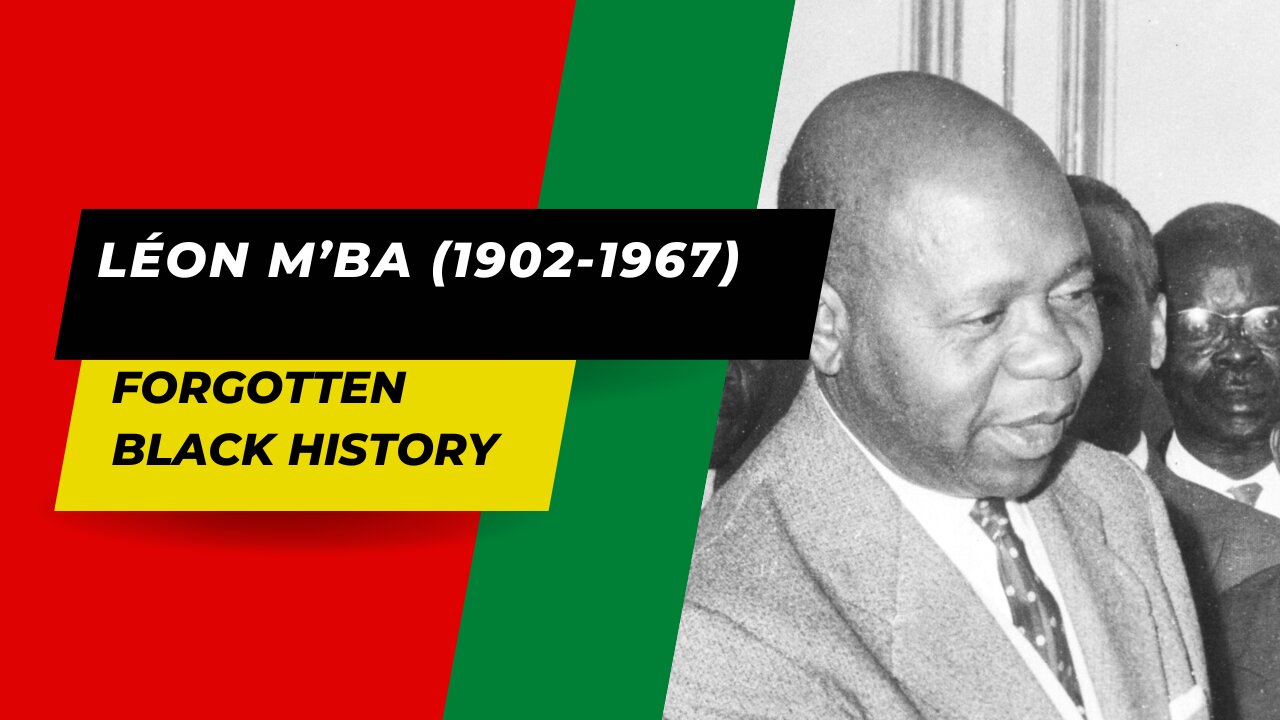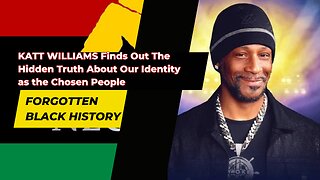Premium Only Content

LÉON M’BA (1902-1967)
This video is brought to you by, Fiverr: https://go.fiverr.com/visit/?bta=500952&brand=fiverrhybrid
Fiverr Learn: https://go.fiverr.com/visit/?bta=500952&brand=fiverrlearn
Fiverr Business: https://go.fiverr.com/visit/?bta=500952&brand=fb
Become a Fiverr Affiliate: https://go.fiverr.com/visit/?bta=500952&brand=fiverraffiliates
Fiverr Workspace: https://go.fiverr.com/visit/?bta=500952&brand=workspace
Welcome to "Forgotten Black History". On this channel we talk about special places, events and people in Black History, This page serves as an index to the prominent figures featured throughout the Black History society. Black history is the story of African Americans in the United States and elsewhere. We want to celebrate, remind, and pay respect to not only African Americans but Black people of all races and backgrounds. We hope you subscribe to join the family, so we can grow a small community to help people of all races know just how special black people actually are in the world. Thank you for taking the time out to visit our channel. We hope you subscribe, if you hadn't already. We wish you peace and love, and for you to stay safe out there.
Nwanyereuwa was an Igbo woman from southeastern Nigeria who became famous because of her leadership in the Aba Women’s War in 1929. Nwanyereuwa’s exact birth and death dates, as well as her exact place of birth are unknown. However, by 1929, she had become an influential market woman living in Oloko, in the Aba region where she was famous for selling palm oil and palm kernels. Though little is known of Nwanyereuwa’s personal details, or any of the major events of her life before or after 1929, she is remembered and revered for her leadership role in the Aba Women’s War.
Upon hearing that British colonial authorities who governed Nigeria at that time, were attempting to implement new census and taxation measures on women in her region, Nwanyereuwa took action that changed the course of Nigerian history. She utilized the market networks common in traditional Igbo society to organize a women’s movement against local Igbo warrant chiefs, particularly one Chief Okugo. Warrant chiefs had long been the main collaborators with British colonial authorities and routinely enforced their policies.
The common form of protest among Igbo women in this period was a mechanism known as “sitting” in which women would gather at the compound (or home) of the wrongdoer to sing, dance, and generally create a disturbance. Sitting was generally used as a form of punishment as well as to influence change. In this instance, Nwanyereuwa and her fellow market women were calling for Chief Okugo to resign from his position as warrant chief. They surrounded his compound, singing songs throughout the night, before eventually mobbing him and damaging his home.
Nwanyereuwa’s call to sit in protest of the warrant chiefs who had agreed to the British’s new taxation, spread far and very quickly, resulting in thousands of Igbo women gathering outside the home of Chief Okugo in mere hours. Word spread throughout Eastern Nigeria the following weeks, and riots against the British broke out across the region. Though an estimated 50 to 60 Igbo women were killed during the rebellion, their efforts did result in the delay of new taxation policies for a few years.
In March 1930, just two months after the Aba Women’s War, Nwanyereuwa is quoted as saying, “We had no money to pay tax. I was once a rich woman, but as [Okugo] had been taking money away from me I had now no money.”
Nwanyereuwa is credited with starting a movement which ignited anti-colonial sentiment to many historians was the beginning of the independence movement in Nigeria and across West Africa. Her leadership in the Aba Women’s War is symbolic of the power of women’s influence in colonial Igbo society.
Gabriel Léon M’ba was the first President of Gabon. He was born in Libreville, Gabon, French Equatorial Africa on February 9, 1902, and was a member of the dominant Fang ethnic group. Both of his parents had some western education. His father was a small business manager and village chief. His mother was a seamstress. M’ba received a basic education from Catholic missionaries at a school in Libreville.
As a young man, M’ba worked a variety of jobs: store manager, lumberjack, and trader. Around 1920 he was hired as a customs agent for the French colonial administration. In 1924 he was appointed head of a canton (county) in Estuary Province. M’ba was an authoritarian administrator and would have colonial subjects whipped if they did not show him proper respect. He was also suspected of embezzlement. He developed connections with a local traditional secret society the Bwiti sect which was blamed for a woman’s murder and M’ba was charged with complicity in the crime. He was not convicted but he was later charged and found guilty of embezzlement and abusive treatment of laborers. He spent some time in prison and from 1933 to 1946, he was in exile in the neighboring French Colony of Oubangui-Chari (now the Central African Republic).
#BlackHistory #ForgottenBlackHistory #BlackPeople
Check out our Rumble page for exclusive videos: https://rumble.com/c/c-1788327
Black Girl Magic 2 Notebook: https://www.amazon.com/Black-Girl-Magic-Notebook-Password/dp/B09JDV6P2X/ref=sr_1_1?crid=16FI46T9S6C04&keywords=B09JDV6P2X&sprefix=b09jdv6p2x%2Caps%2C977&sr=8-1
Black Girl Magic 1 Notebook: https://www.amazon.com/Black-Girl-Magic-Notebook-Password/dp/B09JDVHRX3/ref=sr_1_1?crid=2YZAZVL2TNREJ&keywords=B09JDVHRX3&sprefix=b09jdvhrx3%2Caps%2C1024&sr=8-1
Pretty Black and Educated: https://www.amazon.com/Pretty-Black-Educated-Milton-Thomas/dp/B09DDZDQ76/ref=sr_1_1?crid=1FWNBC193J1S1&keywords=B09DDZDQ76&qid=1660209481&sprefix=b09ddzdq76%2Caps%2C686&sr=8-1
Black Queen Notebook: https://www.amazon.com/Black-Queen-Nutritional-Facts-Notebook/dp/B09DF75XDB/ref=sr_1_1?crid=25VIYL97V8QK1&keywords=B09DF75XDB&qid=1660209567&sprefix=b09df75xdb%2Caps%2C722&sr=8-1
-
 17:19
17:19
Forgotten Black History
8 months agoKATT WILLIAMS Finds Out The Hidden Truth About Our Identity as the Chosen People
2071 -
 2:16:36
2:16:36
Side Scrollers Podcast
15 hours agoStreamer KICKED OUT of Renaissance Fair for Misgendering + Spiderman MELTDOWN | Side Scrollers Live
31.1K3 -
 12:29
12:29
The Pascal Show
1 day agoLOCKED IN A DUNGEON?! Parents Arrested After 5 Children Found In 'Dungeon' At Home
782 -
 LIVE
LIVE
Lofi Girl
2 years agoSynthwave Radio 🌌 - beats to chill/game to
550 watching -
 3:07:24
3:07:24
FreshandFit
7 hours agoPrivileged Nigerian Thinks Women Created Everything: HEATED DEBATE
109K61 -
 5:57:27
5:57:27
SpartakusLIVE
8 hours agoNEW Update - BROKEN Attachment || Viewers REJOICE at the long-awaited Return of Their KING
69.5K -
 2:06:31
2:06:31
TimcastIRL
7 hours agoTrump To Deploy National Guard To Portland, Antifa Has Been WIPED OUT | Timcast IRL
172K142 -
 2:30:00
2:30:00
Laura Loomer
8 hours agoEP142: Loomer Prompts Calls For FBI To Investigate Palestinian Youth Movement
40.9K18 -
 1:26:34
1:26:34
Man in America
11 hours agoExposing the Cover-Up That Could Collapse Big Medicine: Parasites
46.1K19 -
 4:53:00
4:53:00
CHiLi XDD
7 hours agoTekken Fight Night
24.4K1